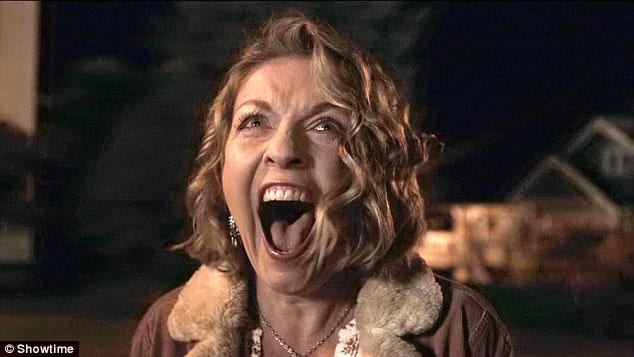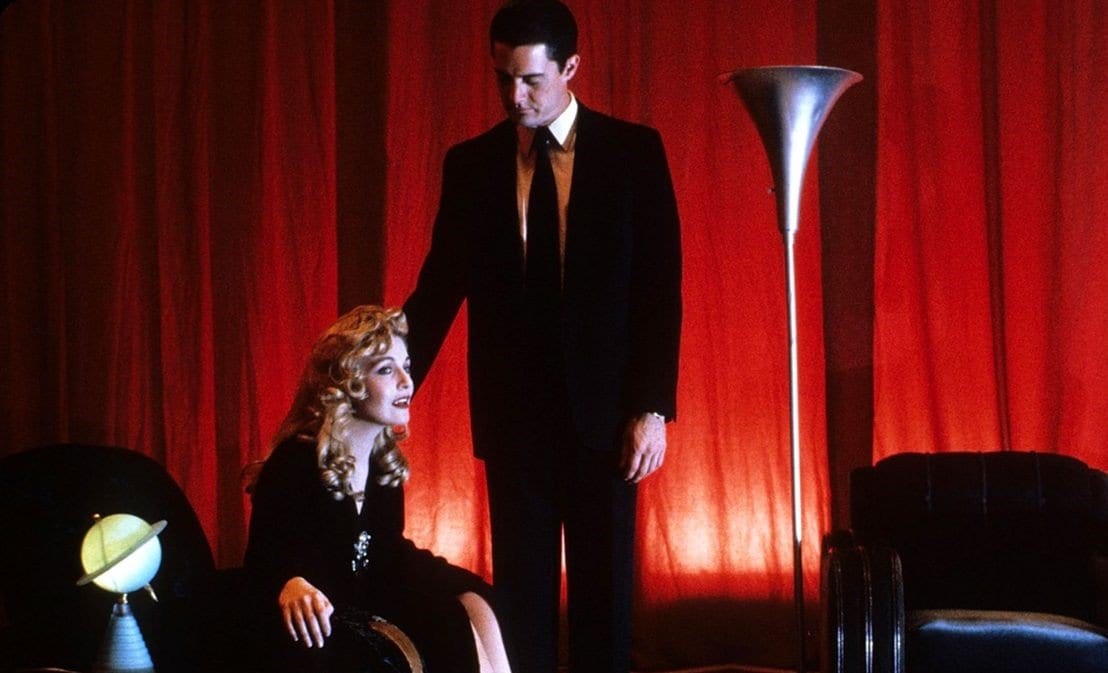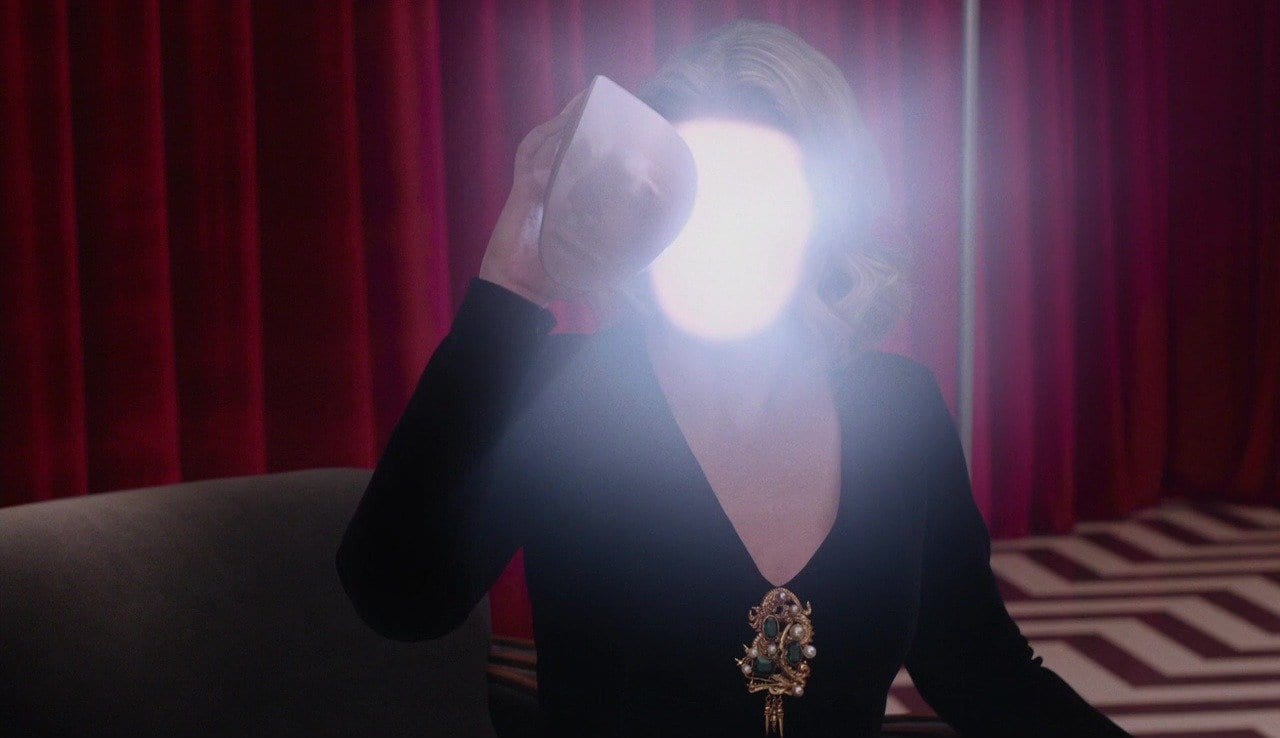In what is generally considered to be the worst Star Trek film of all time (Star Trek V: The Final Frontier) there is one line that has always struck me as important even though it is overshadowed by the badness that is the rest of the script. In classic Captain Kirk confrontational style, Kirk admonishes Spock’s brother, Sybok, with a typically moralistic dressing down:
You know that pain and guilt can’t be taken away with the wave of a magic wand. They’re things we carry with us, the things that make us who we are. If we lose them, we lose ourselves. I don’t want my pain taken away. I need my pain.
We need our pain. It makes us who we are.
So, too, does Twin Peaks.
It might seem strange to compare the Star Trek universe with Twin Peaks but as William Shatner and Mark Frost seem to have no trouble whatsoever in blurring the lines between the two works, maybe we shouldn’t either. In light of The Return‘s bold finale, it seems more appropriate than ever to examine why the ending is so tragic, and your friendly 25YL correspondent believes that it’s because someone (*cough* Dale Cooper *cough*) has been trying to take away the pain of Laura’s death.
I’m certainly not the first to suggest that trauma is and has always been central to the stories at the heart of Twin Peaks. This has been fairly soundly established at this point, especially where it concerns the original series; the removal of Laura from the center of that narrative (by solving her murder) sends the entire show plummeting aimlessly towards its inevitable cancellation. Had they left the murder unsolved, and had the town been left to grieve her death while also committing all manner of sins against one another as if they’d learned nothing from it, I’m certain that we could have gotten a more compelling end to Season 2, and possibly even a Season 3, back in 1991. Like it or not, Laura’s trauma was what made Twin Peaks was it was.
 Which brings me to Agent Cooper.
Which brings me to Agent Cooper.
He was the one we followed into Twin Peaks back on February 24, 1989. He was our way of learning about the townspeople, their quirks, and the evil that lived in their woods. He was intuitive and idealistic, and he seemed like the stalwart hero we — and they — needed. But as we journeyed forward with him through Season 1 and Season 2, we saw him falter. We even saw him fail at the end; he faced the Lodge with imperfect courage and was imprisoned there. Even if it was only his bad side that escaped from the Lodge, for all intents and purposes, Agent Cooper was corrupted, utterly. And that was the tragedy of Season 2’s finale.
The prospect of meeting Coop again after a quarter century in forced purgatory was enticing. What would he have learned in his time there? What would he be like? Certainly twenty five years in a place like that would change a man. Could he ever be the same? We got our answer in Part 16 when Cooper awoke and, in fact, was the same — chipper, upbeat, assertive, a forceful agent of change who was totally in command of every part of his life. But it didn’t feel right that he would walk out of this hell unscathed by his time in there.
Apparently, what we know as viewers of the show is not what Special Agent Dale Cooper understands — or at least what he claims to understand. Twenty-five years on and Cooper seems to have learned little. Even after all this time, he is hell-bent on delivering Laura from her fate.
Cooper’s goal all along — from his under-rug-swept exculpation of Leland in Season 2 to his “Don’t take the ring” warning in Fire Walk With Me to his literal insertion into Laura’s life on the night of February 23, 1989 — has been to erase the reality of her earthly murder. He seems to think that if only he could keep Laura alive, he’d have done right by her. It’s as if death is the worst thing that he can imagine happening to her. Never mind the years of abuse she suffered at the hands of her own father, or the psychological torment she went through at the hands of BOB; if only Laura were alive, Cooper could rest easy. Perhaps Laura could rest easy too; perhaps he think she would be happier. He cannot fathom how deep her trauma goes, or that it has roots in something other than the violence of her murder. He fundamentally misunderstands everything about her.
I have long thought that Agent Cooper suffered from White Knight Syndrome; this was partly because of my reading of his relationship with Caroline, with Annie, and his attraction to Audrey — all three were victims of something, and he believed he could save them. I also based this reading on Cooper’s Autobiography of FBI Special Agent Dale Cooper: My Life My Tapes (MLMT), in which this trend of needing to rescue damsels in distress is extended to his early years. The Return has solidified that for me. Agent Cooper absolutely views himself as a protector, a knight on the front lines in a battle between good and evil in the most black and white sense, and this is most obvious in his fundamentally misguided and ultimately harmful approach to the women in his life.
We know that Cooper was on some kind of long-term quest to find Jowday (Judy) because Gordon told us so. The side-quest to save Laura seems to be coming from within him in some capacity; perhaps it is, as Joel Bocko wrote, because Cooper possesses an “inability to see the humanity of women on their own terms rather than as vessels for his own guilt, chivalry, or desire.” He knows what’s best for them, and is going to do just that whether they want him to or not.
 The problem is that, in a post-FWWM world, Laura does not need to be saved. She found her angel. She ascended. She did it of her own free will, on her terms, forcing BOB/Leland to kill her rather than possess her. She had two shitty options, and she chose the one she wanted. It was horrifying and gut-wrenching but it was the ending Laura chose, and that was the whole point.
The problem is that, in a post-FWWM world, Laura does not need to be saved. She found her angel. She ascended. She did it of her own free will, on her terms, forcing BOB/Leland to kill her rather than possess her. She had two shitty options, and she chose the one she wanted. It was horrifying and gut-wrenching but it was the ending Laura chose, and that was the whole point.
What compounds this is that Cooper appears to think that if only he could take Laura home everything would be okay. He tries this in 1989, and is thwarted by forces beyond his ken when Laura is wrenched from the timeline and apparently deposited in another dimension, in Odessa, Texas as Carrie Page. He tries it again in this other dimension, this time subjecting Diane to revictimization in order to do this (which is a whole other topic). His motives are single-minded and wrong-headed. He must know that if he succeeds in bringing Laura to the Palmer house on the night of her murder, Laura will be safe from death but not from her abuser. And I’m not entirely sure what he expects would have happened had Carrie met Sarah: an ecstatic reunion? A showdown between the blinding-white light of goodness in Laura and the inky darkness inhabiting Sarah? I’m not even sure if this was part of the plan hatched by Gordon, Briggs, and him; it seems as though even Gordon has lost the plot of that story.
But it doesn’t matter — whether because of her survival in February 1989 or the actions of Sarah in the Twin Peaks timeline, the Twin Peaks Carrie and Richard return to is radically different from the Twin Peaks Cooper expects. There’s no road sign on the highway into town. The Double R is dark. And it’s not even Sarah Palmer who answers the door.
 Cooper is frustratingly confused about why this brilliant plan of his didn’t work out, but we could have told him why all along: you can’t change the past. But more than that, he didn’t actually go far enough in his goal of saving Laura, if that was his goal all along. He may have prevented her from dying that February night but he didn’t undo the years of abuse before that, or stop the abuse from continuing. As he asks the now infamous question “What year is this?”, Carrie hears bleed-through from the world Cooper remembers — the sound of Sarah calling her daughter down to breakfast on the morning her body was found — and screams. Does Carrie remember that life now? If she does, was it justified?
Cooper is frustratingly confused about why this brilliant plan of his didn’t work out, but we could have told him why all along: you can’t change the past. But more than that, he didn’t actually go far enough in his goal of saving Laura, if that was his goal all along. He may have prevented her from dying that February night but he didn’t undo the years of abuse before that, or stop the abuse from continuing. As he asks the now infamous question “What year is this?”, Carrie hears bleed-through from the world Cooper remembers — the sound of Sarah calling her daughter down to breakfast on the morning her body was found — and screams. Does Carrie remember that life now? If she does, was it justified?
FWWM was Lynch in the world of Twin Peaks unfettered by network controls for the first time; I believe he made the movie he wanted to make in 1992. Now, of course he is free to revise his opinions of the film and the message he wants to send — the film is his creation; such is his privilege and right as creator to change it as he pleases — but I find it hard to believe that he would take the powerful ending of FWWM and subvert it in order to further inflict pain on his beloved Laura for no reason whatsoever, as my reading of this ending does. There must be some other reason.
Cooper’s guilt over not being able to save Laura in the first place is what leads him down  this path. Laura found peace at the end of Fire Walk With Me; he was there to see it happen. But he thought he could do better; he thought he knew better. So he went back in time the first chance he got and screwed everything up. He loses Diane; he loses his friends in Twin Peaks; he loses out on the chance to be the hero in a very real way where he is most needed. Imagine all the ways Cooper could be of assistance in town? He’d clean up the drug trafficking issues, he’d figure out whatever was going on with Becky, he’d save Audrey…
this path. Laura found peace at the end of Fire Walk With Me; he was there to see it happen. But he thought he could do better; he thought he knew better. So he went back in time the first chance he got and screwed everything up. He loses Diane; he loses his friends in Twin Peaks; he loses out on the chance to be the hero in a very real way where he is most needed. Imagine all the ways Cooper could be of assistance in town? He’d clean up the drug trafficking issues, he’d figure out whatever was going on with Becky, he’d save Audrey…
Instead of doing that (and staying, as some have suggested, within the dream of Twin Peaks) Cooper — like us — attempted to go home again. But when he got there it was no home that he had ever known, and no home that Carrie had ever known. He revictimizes Laura her by dragging her back to the place of her greatest terror and forcing her to confront that terror head on. Why? It wasn’t because Laura wanted him to, that’s for sure; she was at peace. Cooper ruined that.
Some have suggested that the end of The Return mirrors a kind of video game, or maybe a Choose Your Own Adventure novel. I find this possibility extremely intriguing. Is it possible that Cooper managed to lose Laura and himself to the slipstreams of time in what could be an infinite loop the kind Philip Jeffries fell into and the one he might have been warning him about earlier in the finale?1 Is it possible that Cooper is now forced to play out various versions of events to their conclusions? We see him loop back to the Red Room as the end credits roll. Time is repeating itself. He’s back at the beginning. Starting position. Maybe he hasn’t left the Lodge yet after all. But maybe next time he’ll try something else. And maybe he’ll succeed.
It’s a sad ending of a different sort (turning Cooper into a tragic hero rather than a Romantic one, as many have wanted him to be from the start) but for me it offers a modicum of hope: if this is all some kind of grand Lodge simulation, then perhaps Cooper can learn the right sequence of events that will lead him to the right conclusion. He doesn’t have to undo Laura’s self-made salvation. He can grow out of his need to save her. Maybe he can start by recognizing that what (I think) she’s whispering to him is true: “You can’t save me.”
I’m not saying this is the only read of this situation. There are Buddhist readings and various Dream theories; there’s a read that suggests the ending is taking place in a pocket universe of Jowday’s creation, meant to keep Laura from fulfilling her destiny as initiated by The Fireman in Part 8; there are even positive readings, that insist that because the lights go out in the Palmer house at the end (and because the familiar Lynch/Frost logo at the end appears without that electricity buzz) it means that evil was vanquished after all. But in a season that dealt so much with trauma — Becky’s abusive relationship, the cycle of abuse in Shelly’s life, gory physical violence in Las Vegas, and the sexual assault of both Diane and Audrey — it’s hard not to see Carrie/Laura’s scream at the end as a message that the trauma is real. Even if everything we’ve seen is a dream, the trauma is real because we know it’s there, we saw it happen, and we remember it, and our minds are powerful things. Attempting to erase the trauma, no matter how pure our intentions are, is not helpful. In fact, in the end it may do more harm than good.
After all these years, maybe Dale Cooper should know that. Maybe the fact that he doesn’t seem to know, and that he appears as rootless and drifting as smoke from a fire as he stands in front of the Palmer house, tells us something about where he is on his journey. He’s still learning. He still has miles to go. It is why I’m both grieving and celebrating the finale. I never thought Agent Cooper was a superhero; I had faith that he was wiser than this. Maybe given the way this ends, there’s room to hope that he will, eventually, learn what he needs to.
Eileen and I chatted about this at length the night of the finale and something she said stuck out. “Perhaps all these years we’ve been seeing Agent Cooper as a piece on a chess board, but we all thought he was the bishop or the knight. In reality he was just a pawn.” I quite like that summation. Pawns are still important pieces. They have a purpose on the board. With luck and perseverance, they could make it all the way to its opponent’s end and be promoted; they could even become the Queen, the most powerful piece on the entire board.
But they can never become the King, the most important piece.
 Dale was never the most important piece in this puzzle; that grace, that curse, always belonged to Laura Palmer. But in his wild machinations, and because he was never as good at chess as the people he was playing against, he misjudged everything. He took away what he thought was the source of Laura’s pain and suffering — something she had managed to fix for herself at the end of FWWM and which she may have shown him was no longer troubling her (when she removed her face to show the blinding enlightenment within her) — and in the process wrote them both into a terrible corner.
Dale was never the most important piece in this puzzle; that grace, that curse, always belonged to Laura Palmer. But in his wild machinations, and because he was never as good at chess as the people he was playing against, he misjudged everything. He took away what he thought was the source of Laura’s pain and suffering — something she had managed to fix for herself at the end of FWWM and which she may have shown him was no longer troubling her (when she removed her face to show the blinding enlightenment within her) — and in the process wrote them both into a terrible corner.
I hope this is just one version of the ending, and that there’s a version out there wherein Our Special Agent has figured out what he really needs to do, which is to acknowledge the trauma and suffering of the people he loves (himself included) and to live through it, instead of wishing he could go back in time and erase it.
I still love Dale Cooper. But I reserve the right to be a little disappointed in him at the moment, and to feel the pain of his mistake.
After all, Kirk says we need our pain.
(For an in-depth examination of trauma as it relates to Laura’s Lodge situation specifically, check out John Bernardy’s Electricity Nexus: Cooper’s Time Loop Isn’t Just His)
1 This requires an assumption on my part: I do believe Jeffries was offering a warning, and that it’s possible The Fireman was as well. “430”, “Richard and Linda”, and “two birds with one stone” could conceivably be portents of doom that Cooper should avoid rather than clues to lead him to his goal. Cooper claims to have understood the intent behind The Fireman’s words, but I wonder if he did.
